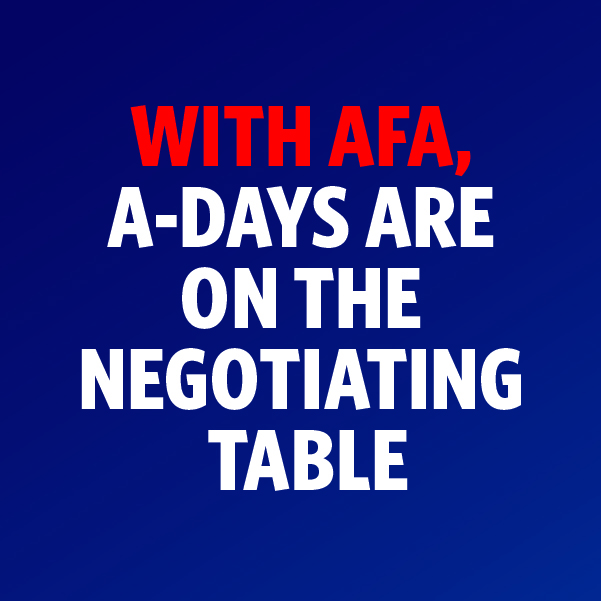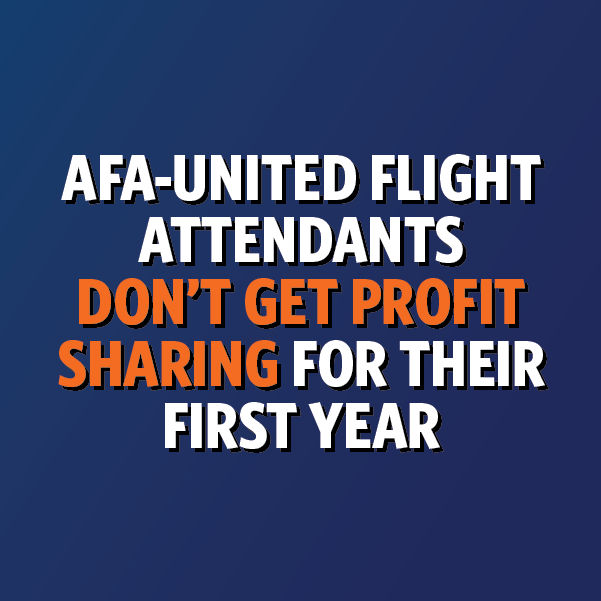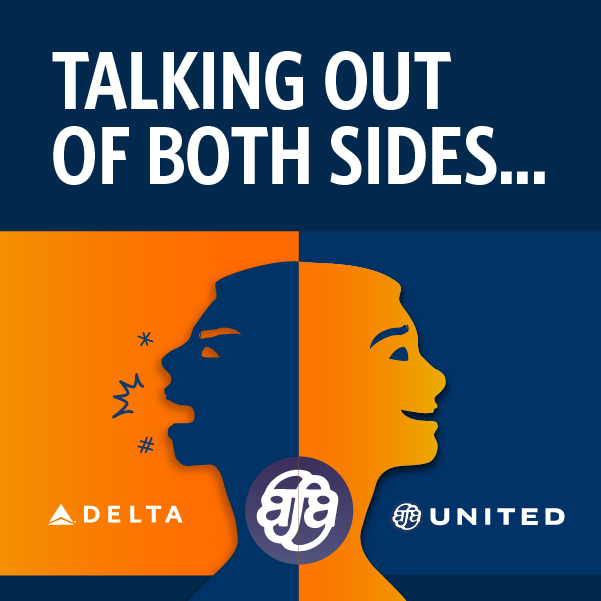Rumor Has It: January 2025
Note: “Rumor Has It” is a biweekly newsletter sent to Delta flight attendants about a range of topics from company policies to questions about flight benefits and what is happening around the industry. Delta occasionally addresses questions in Rumor Has It related to AFA’s organizing efforts. For ease of reference, those questions and answers have been included below.
In this week’s edition, we address questions and rumors from around the system about the Association of Flight Attendants (AFA), the union trying to represent Delta flight attendants.
From January 23, 2025 Edition
RUMOR: Delta flight attendants are getting double the profit sharing payouts as United flight attendants will get.
FACT: True. United flight attendants, represented by AFA, are expected to receive a profit sharing payout of 5.29%. That’s almost half of what Delta flight attendants are receiving (10.0%). It’s also less than what United pilots are expected to receive (7.89%) because their pilots use the same profit sharing formula that we use for all eligible Delta employees; AFA, meanwhile, negotiated a different formula for their flight attendants.
RUMOR: I heard that signing an A-Card just helps AFA get to a “democratic” vote and that I can always just vote “no” then.
FACT: AFA is misleading you into signing an A-Card, which is a much bigger deal than just getting to a vote. Even AFA has said that only flight attendants who want AFA representation should sign an A-card.
If you sign an A-Card and there’s an election, you risk an outcome you don’t want. AFA only needs a majority of flight attendants who vote to win an election. That means, if most flight attendants do not vote, a minority could end up making this decision for the whole workgroup.
Also, during an election, certain changes in wages or benefits may be considered “interference” by the National Mediation Board. The law in this area is complicated and there are many factors that are considered. During the Delta/Northwest merger, the election process took a year and a half, and in one instance an improvement in pay was deemed interference. In general, any flight attendant who does not want to pause our work with the EIG and wants to continue our culture of continuous improvement should not sign an A-card merely to get to an election and then vote “no.”
QUESTION: How does AFA know my name and the rotation I’m flying? Are they allowed to tell other flight attendants whether or not I signed an A-Card? How can I get them to stop pressuring me?
ANSWER: Based on flight attendant feedback to leaders, AFA organizers are actively sharing employee names, trip schedules, and personal information (e.g., phone numbers) with AFA so that union organizers can confront employees and, in some cases, pressure them to sign A-Cards. Delta does not give out your private information or share your trip schedules with AFA.
We know this is frustrating for many of you and some of you consider this a violation of your privacy.
If at any time you feel pressured or uncomfortable, remember you have the right to say “no” to AFA. If you feel the behavior has become threatening or harassing, you have the ability to report the interaction to a leader.
These AFA tactics underscore why your decision to sign an A-Card is so important – and why AFA might think the stakes are so high with every interaction: once you sign an A-Card, AFA is not required to return it if you change your mind.
RUMOR: AFA will give me a voice in major decisions.
FACT: With AFA, your voice is much more limited than it suggests:
You don’t get a say on who represents you in negotiations.
You don’t get to elect your Master Executive Council officers.
You don’t get to vote on AFA national leaders.
You don’t get a say in how much you pay in dues.
You don’t get to vote on changes to AFA’s Constitution and Bylaws, even though you will be required to follow them or be at risk of expulsion.
And if you don’t like it, under AFA’s Constitution & Bylaws, flight attendants can be fined, suspended, or even expelled for speaking out and being “disloyal” to the union.
RUMOR: AFA says they could get us an industry-leading first contract within months.
FACT: If this were true, AFA would’ve demonstrated this with other flight attendant groups it represents. In reality, here’s what AFA has accomplished when it comes to first contracts:
Just this month, after more than two years of negotiations, AFA reached a tentative agreement for Eastern Airlines flight attendants that includes no boarding pay, no holiday pay, 50% deadhead pay, requires permission from a supervisor to trade trips, 10 vacation days, a max sick bank of 35 hours, full-month reserve, and the same retirement and health insurance benefits as the company’s non-union employees. Eastern’s 45 flight attendants voted for AFA in June 2022.
And there’s more:
Avelo Airlines (225 flight attendants): Still negotiating after nearly 3 years
Omni Air (400 flight attendants): Nearly 6 years of negotiations
GoJet Airlines (360 flight attendants): More than 3.5 years of negotiations
Negotiations in the airline industry are complex and lengthy. There are thousands of items on the table and each proposal can take months or even years to discuss. Imagine how long it would take for AFA to negotiate a first contract for a workgroup of Delta’s size – something they’ve never even done before.
RUMOR: AFA would never negotiate a contract without A-Days.
FACT: Actually, AFA has never negotiated a contract WITH A-Days. Everywhere else in the industry – including every AFA-represented airline – uses a full-month reserve system, which requires junior flight attendants to take on schedules with less predictability, limited flexibility, and less earnings potential.
During contract negotiations, it’s not as simple as keeping everything you have now and adding more. Give and take would be required from both sides, especially to ensure operational stability. In the end, everything – like A-Days – is up for negotiations, and any one item can end up better, worse, or the same as what you have today.
RUMOR: When flight attendants receive things like per diem and vacation pay increases, it is not because of Delta and its work with the EIG, but because the pilots negotiated it.
FACT: Not true. Nothing requires Delta to provide the same per diem or vacation pay to flight attendants and pilots. The same is true at our competitors.
Neither the American APFA nor the United AFA contracts require flight attendants to receive the same per diem or vacation pay as pilots, not to mention a host of other items. For example, American pilots have the same per diem as Delta pilots and flight attendants ($3.30/$3.55 for 2025), but the 2025 American flight attendant per diem (not effective until October) will be lower ($2.90/$3.45).
Another example – United pilots receive 4:15 hours of pay per vacation day while United flight attendants receive 3:15 and they haven’t had an increase in 8 years. In addition, United flight attendants have a different profit sharing plan than United pilots.
These are just two examples (of many) demonstrating that, under flight attendant contracts, there is no guarantee that items like per diem and vacation pay will be the same as pilots. All of this is subject to the “give-and-take” of negotiations between the company and the union. Delta provides flight attendants the same per diem and vacation pay as pilots because of our culture, not an obligation.
RUMOR: Delta just waits to see what unions secure at other airlines before they change something.
FACT: Delta consistently sets the industry standard, and unionized carriers follow. Delta has been first to implement a range of favored pay, benefit, and work rule components like A-Days, boarding premium pay, and a profit sharing formula that gives Delta employees a higher percentage of the company’s profits than anyone in the industry. Consider that American flight attendants just secured Delta’s profit sharing formula and Delta’s boarding premium pay – not the other way around.
As with any industry, the timing of pay, benefit, and work rule components can vary across companies. Sometimes we may implement a change while a competitor is actively negotiating or is in the middle of a contract, or a competitor just secured an enhancement that we need to consider. This approach is part of what makes Delta and the culture we have built together great and gives you an advantage: we don’t have to wait to improve something once every four-or-so years when a contract opens for negotiations.
While timing can vary, one thing that doesn’t change is our commitment to providing you with industry-leading total compensation for industry-leading performance and the best total package of pay, benefits, and work rules around.
RUMOR: An AFA contract can ensure we get real-time support to prevent reroutes during IROPs.
FACT: IROPs and reroutes happen, and AFA can’t promise you that it can resolve scheduling issues in real time during an operational disruption. In fact, AFA doesn’t offer this in any of its contracts. As you know, during IROPs everyone is focused on stabilizing the operation.
Even at AFA-represented carriers, flight attendants still have to fly their trip during IROPs. AFA tells its United flight attendants that they cannot “decline” working a trip during irregular operations. With AFA, it’s “fly now, grieve later,” meaning flight attendants would still have to fly the reroute or reassignment, and then rely on a grievance process that may be lengthy and may not even provide the desired resolution.
From January 14, 2024 Edition
QUESTION: AFA claims that a union contract ensures “a snowstorm doesn’t automatically place every flight attendant on perfunctory A-Days.” Is this true?
ANSWER: No. Delta flight attendants do not have their tripholder status changed to A-Days automatically during IROPS.
Reroutes, cancellations, and delays happen throughout the industry. However, work rules and operational recovery programs, like full-month reserve, can vary depending on the airline’s size and type of operation.
At Delta, our A-Day program provides flexibility, a better quality of life, and greater earning potential than the full-month reserve programs found in AFA contracts. That said, because of the program’s uniqueness, we have a smaller pool of flight attendants on-call or serving airport standby to help with operational recovery versus those airlines with full-month reserve. This can cause tripholders to experience a schedule disruption.
AFA suggests that with an AFA contract, flight attendants will have both: work rules that further restrict reroutes and our current flexible A-Day program. AFA has never negotiated both anywhere. A system that places more restrictions on tripholder reroutes would naturally require more flight attendants on reserve to cover the operation when the unavoidable irregular operations happen.
AFA wants to pretend that it will negotiate a contract that will be everything to everyone and that is simply not the reality.
QUESTION: I was approached by a flight attendant in the concourse who kept pressuring me to talk about AFA and sign an A-card, even after expressing I didn’t want to. Is that allowed?
ANSWER: Delta respects all employees’ rights to express their views regarding union representation and believes AFA organizers should do the same. Remember, you have the right to say “no” and be left alone – at no time should you feel bullied, harassed or intimidated, regardless of the topic of conversation.
This type of behavior is not representative of our core values and our Advocacy policy prohibits unprofessional conduct. Leaders are available to support you if you believe you’ve experienced this.
QUESTION: Last week Delta announced our 2024 profit sharing payout, but how does it compare to what United flight attendants will get?
ANSWER: While we don’t know United’s profit sharing payout yet because they haven’t reported their Q4 earnings, here’s what we do know about their program:
United is a less profitable company than Delta, which means its award pool and payout will be less than ours.
Under United AFA’s current contract, new hire flight attendants are not eligible for profit sharing until they complete one year of service. That means any United flight attendant who started in 2024 will not receive a profit sharing check this year.
United flight attendants receive a smaller profit sharing percentage payout than their pilots.
In the last 10 years, a United flight attendant has received at least 6 months less in extra pay through profit sharing than their Delta counterpart on average.
At Delta, everyone receives the same payout percentage, and the over 700 flight attendants who joined our team in 2024 will be receiving their first profit sharing check on Feb. 14. Since 2015, Delta has shared over $10 billion in profit sharing.
Related Articles

JAN 17, 2025
Delta flight attendants spend fewer days on call than at American or United
Delta’s A-Days program offers more flexibility than unions’ reserve systems.

FEB 16, 2024
From Day One, Delta flight attendants qualify for profit sharing
The same is not true at AFA-represented United.

JAN 27, 2023
AFA's Two-Faced Approach to Profit Sharing
AFA criticizes Delta’s profit sharing payment while justifying a lower payout at United.
Stay in the know.
Text DELTA to +1 205 846 8096 for updates*
Stay in the know.
Text DELTA to +1 205 846 8096 for updates*

